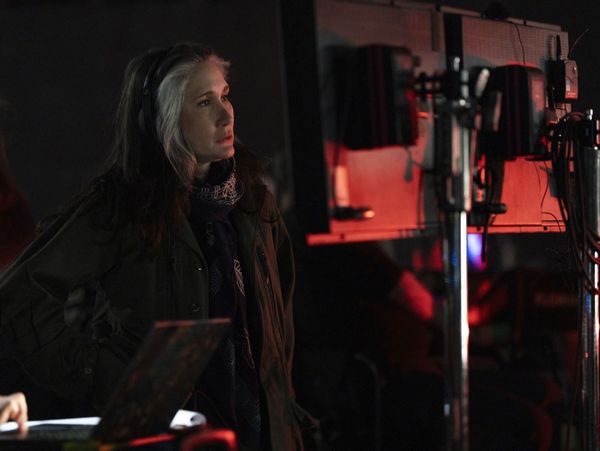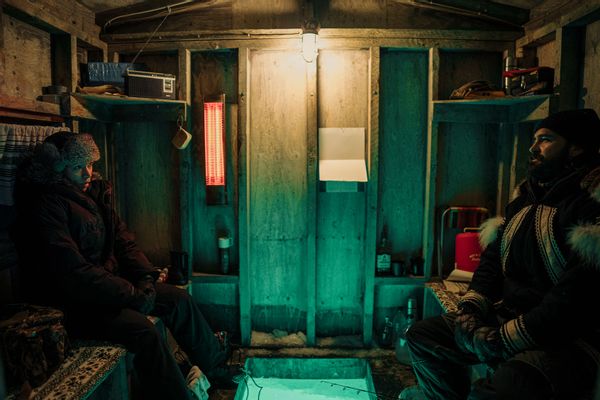
In the space of a hard day of work for “True Detective: Night Country” trooper Evangeline Navarro (Kali Reis), she busts a guy who has assaulted his girlfriend, calms her mentally ill sister after she's experienced a delusion, and has a grim conversation with a man mourning a loved one whose murder remains unsolved.
After all that, the way she gently knocks on the back door to Eddie Qavvik’s place lets us know she’s there for different reasons. Eddie, played by Joel D. Montgrand, is a bootlegger and a dog runner. Fights break out in his bar all the time. But the way he looks at Navarro reveals him to be the softer of the two. He greets her with, “Evangeline.” She responds with his last name – “Qavvik” – implying a shield of formality.
What we see them doing after that, however, is very personal. The scene cuts to Navarro on top of Qavvik rhythmically grinding into him as he pants and smiles, before he squeezes his eyes shut and whispers, “Wait.” She doesn’t, moving faster, more forcefully, placing her hand over his mouth before holding his hands down as he loudly climaxes.
The camera holds a tight shot on Navarro's face as she stares down at Qavvik looking pleased, powerful and victorious. She doesn’t moan, bite her lower lip, or make any of the classic signals the audience has been conditioned to read as "woman getting off on man's manhood." Navarro doesn’t make any sound that would give Qavvik an indication of his performance, because this assignation isn’t about arousing him or the viewer. It’s entirely about and for her.
Then she steals his toothbrush.
“Night Country” creator and director Issa López establishes her imprint on the fourth entry in the “True Detective” franchise long before their interlude, but it is an important benchmark for this chapter. If her turn in the auteur’s chair is meant to explore the female experience, López explained in a recent Zoom interview with Salon, that has to include how her characters handle sex.
“That was very important for me, since [the original] ‘True Detective’ did such a good job of exposing how . . . a certain type of man conceives the sexual exchange that happens and what impact it has around them, and what it says about the characters,” López said. “I thought it was a perfect opportunity to talk about how women who are powerful, and who are making the decisions in their lives, approach sex. And it's in power. And it's for fun. And it's unashamed. It's just good, fun sex.”
“True Detective: Night Country” hearkens back to the critically acclaimed first season pairing Matthew McConaughey’s Rust Cohle with Woody Harrelson’s Marty Hart. Rust is a haunted man struggling with alcohol addiction who clashes with Marty from the start, but never so angrily as when he calls Harrelson’s detective on his hypocrisy concerning his paternalistic view of women and family.
Marty cheats on his wife Maggie (Michelle Monaghan) while pretending to be righteous, but the way Nic Pizzolatto writes Rust doesn’t make him seem much better. Rust is cold and distant, having more extensive conversations with the sex worker from whom he buys Quaaludes than with his girlfriend.
Both men receive far more dimensionality than the women featured in that season, most of whom are cathouse bunnies or victims or, in Maggie’s case, unhappy buzzkills.
No scene is more indicative of the clarity with which López delivers her side of the conversation with that original season than its first sex scene. The physical circumstances of the encounter are nearly identical, with Marty’s mistress Lisa (Alexandra Daddario) on top of him after she’s handcuffed him to a shelf bracket. But it’s plain that Lisa’s role is to fulfill Marty’s fantasy. Whether she takes pleasure from it is secondary. At times she even responds to his groping with irritation – playfully, perhaps, but she pulls up her shorts nevertheless.
“You see lots of consensual sex in TV and films with women. But it doesn't mean it's their choice or they have a power dynamic where they control it. Consent doesn't always mean control,” Reis observed in a separate interview with Salon discussing her scene with Montgrand.
“With this, you see consent and control, and it’s when, where, and who. And why,” she continued. “It doesn't have anything to do with the male in that regard.”

Ten years later López takes a kinder view, describing it as “a precise portrayal of the male mind” and “a journey into maleness.” It's about male wishes, desires, fears, insecurities, obsessions, she said, “the things that that men want to look at and the things that men don't want to look at. The way they interact and think of women.”
But, as López points out, the world has changed massively since 2014. The first two “True Detective” seasons pre-date #MeToo, Donald Trump’s presidency, the pandemic and George Floyd’s murder. “The identity of what America is, and how America relates to itself has changed and become way more complex,” Lopez observed. “ So what happens if you ask the same questions today, to me? My answer is going to come from a female place.”
Squishy, it ain’t. López designed “Night Country” to meditate on women’s fixations, obsessions, insecurities and fears. “Their understanding of the inner workings of the universe and the secrets of the self itself,” she notes. “As long as the flavor of ‘True Detective’ is in it, as long as the DNA of ‘True Detective’ is in it, it allows us to open a different door in this house.”
Windows, too, through which we bear witness. If watching Navarro and Qavvik's scene feels less violative, bear in mind that the first “True Detective” was produced in the pre-intimacy coordinator era. Daddario had to do the scene topless; Reis keeps her bra on and is no less seductive.
“Issa was all about saying, ‘Well, both of these women are very powerful and are in touch with their sexuality, and they experience it and use it and love differently than the men do,'” said Reis' co-star Jodie Foster, who plays police chief Liz Danvers.
The series premiere only hints at what turns on Danvers when a colleague jokes about her having a Tinder profile. (She plays the telltale bell from her phone as a notification about a fantasy football pick.) By the second episode, we get a better of how her view of sex “reveals [her] messy personhood,” as Foster puts it.
Danvers likes to sleep around. Where she gets in trouble is that her partners tend to already be in relationships. Women speak to her with a telltale chill in their voice that has nothing to do with the outdoor temps. Some men become sheepish around her.
“I got the funny part,” Foster joked. “I got the funny sexuality.”
Danvers, López explained, is a straight woman. Navarro is written as a bisexual woman, “but we only see them having sex with men,” she said. This is intentional. “Both of them act in the ways that male characters traditionally have played forever,” she said. “And what's ironic is that Danvers gets all this s**t and all the jokes about her sexuality. Well, if she were a male character, no one would comment on the fact that she f**ks around in town.”
Danvers also has a specific purpose for sex that Foster appreciates. “There's something very interesting about that particular woman using her sexuality as a distraction, the same way you'd use fantasy football or the spelling bee in the New York Times, or you know, anything to keep you from feeling,” the actor observed. “In some ways, it's a way of being in touch with the body without feeling the feelings that you're trying to avoid. And that's very new and interesting for women. And, I think, very true.”
The act between Navarro and Qavvik holds an altogether separate meaning, in that it looks intimate only from one person’s perspective – his. Reis’ character draws pleasure from the experience but the kind not demonstrated by simulated sighs, closed eyes, and shudders. Qavvik is the one who pines for a romance. Navarro does the leaving.

Lest viewers weigh her approach incorrectly, López stresses that the sexuality in “Night Country” is not the center of the story. “You know, this is not ‘Sex and the City,' which is great on its own. This is ‘True Detective,’” she said. “As with the other ‘True Detective’ [seasons], sex is part of the lives of these characters, and how they approach it says a lot about who they are,” says Lopez.
“I'm tired of the tropes that we see,” she added. “I was very curious about these women taking pleasure from their sexual partners, for the pleasure. Not for the company. Not for the comfort. Not for the chat. For the pleasure, you know, because they're tense sometimes.”
New episodes of "True Detective: Night Country" air at 9 p.m. Sundays on HBO and stream on Max.







